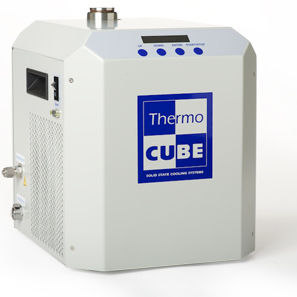
- Industrial machines and equipment
- Heat Exchanger and Refrigeration
- Industrial cooler
- Solid State Cooling Systems
Industrial chiller ThermoCube 200-500 seriescompactstainless steelbenchtop
Add to favorites
Compare this product
Characteristics
- Applications
- industrial
- Other characteristics
- compact, stainless steel, benchtop, thermoelectric
- Power
Min.: 200 W
(682.43 BTU/h)Max.: 500 W
(1,706.07 BTU/h)- Maximum temperature
Min.: -5 °C
(23 °F)Max.: 65 °C
(149 °F)- Flow rate
Min.: 0 l/min
(0 us gal/min)Max.: 4.5 l/min
(1.189 us gal/min)- Pressure
Min.: 0 psi
Max.: 60 psi
Description
ThermoCube 200-500
Versatile, customizable precision recirculating chiller for a wide variety of applications
Four base models with cooling capacities from 200 to 500 watts
±0.05°C Temperature Stability/repeatability
Utilizes highly reliable, refrigerant-free thermoelectric technology.
Responds quickly to change in load
Low noise, low vibration
Designed to be configured to meet your specific needs
9 pump choices: Diaphragm, Centrifugal and Gear pumps
8 fitting choices
Available with aluminum (standard), copper or stainless steel cold plates
14 other configurable options, such as RS232, extended temperature range, alternate fluids and stainless steel plumbing
Compact size: 13” x 11” x 13”
Energy efficient, only uses power when needed to maintain temperature
Universal power – plug in and go anywhere in the world
Easily customizable beyond the many standard configuration options
The perfect solution for analytical instruments, medical equipment, lasers/optics industrial applications, general lab use and many other applications.
Catalogs
No catalogs are available for this product.
See all of Solid State Cooling Systems‘s catalogsOther Solid State Cooling Systems products
Benchtop Chillers
Related Searches
- Chiller
- Liquid chiller
- Water chiller
- Air chiller
- Industrial chiller
- Compact chiller
- Stainless steel chiller
- Air-cooled recirculation chiller
- Laboratory recirculation chiller
- Air-cooled chiller
- Water-cooled chiller
- Cold plate
- Custom chiller
- Thermoelectric chiller
- Chiller for hydraulic applications
- Aluminum cold plate
- Electronic chiller
- Glycol water chiller
- Thermoelectric cold plate
- Liquid-cooled cold plate
*Prices are pre-tax. They exclude delivery charges and customs duties and do not include additional charges for installation or activation options. Prices are indicative only and may vary by country, with changes to the cost of raw materials and exchange rates.




